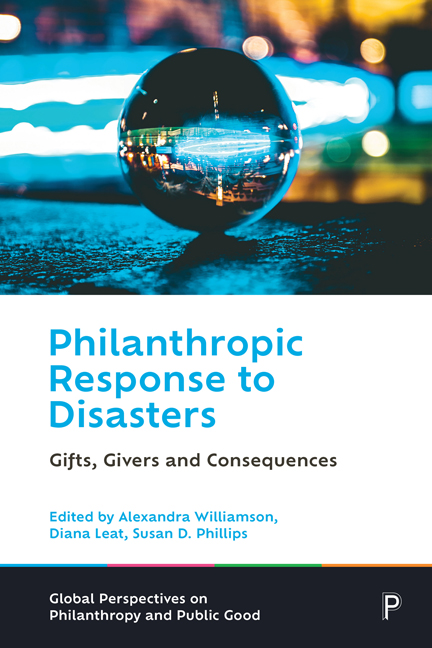Book contents
- Frontmatter
- Contents
- List of tables and figures
- Notes on contributors
- Series editors’ preface
- 1 Introduction
- 2 The public’s philanthropic response to disaster: plus ça change?
- 3 Disaster fundraising: readiness matters
- 4 Roles of philanthropic foundations as funders and distribution agents in disaster response
- 5 The private sector and disasters: from reactive response to disaster resilience
- 6 Fundraising, grantmaking and regulatory issues: regulating good in bad times
- 7 Doing good better: public policy for disaster philanthropy
- 8 Philanthropy’s place in community-based capacity development for disaster resilience
- 9 Nonprofit collaboration and coordination in disaster response: lessons from the 11 September recovery
- 10 The promise and reality of philanthropy in disasters
- 11 Conclusions and looking forward
- Index
Series editors’ preface
Published online by Cambridge University Press: 17 January 2024
- Frontmatter
- Contents
- List of tables and figures
- Notes on contributors
- Series editors’ preface
- 1 Introduction
- 2 The public’s philanthropic response to disaster: plus ça change?
- 3 Disaster fundraising: readiness matters
- 4 Roles of philanthropic foundations as funders and distribution agents in disaster response
- 5 The private sector and disasters: from reactive response to disaster resilience
- 6 Fundraising, grantmaking and regulatory issues: regulating good in bad times
- 7 Doing good better: public policy for disaster philanthropy
- 8 Philanthropy’s place in community-based capacity development for disaster resilience
- 9 Nonprofit collaboration and coordination in disaster response: lessons from the 11 September recovery
- 10 The promise and reality of philanthropy in disasters
- 11 Conclusions and looking forward
- Index
Summary
Conflict, combat, COVID-19, climate change. Political, economic, humanitarian and environmental crises dominate current public and private attention; they present global challenges of a magnitude not seen since World War II. To address and overcome these challenges, a prominent role is ascribed to individual and institutional philanthropy: the use of private resources – time, treasure, talent, ties – for public purposes, from providing immediate relief support to funding innovation and acting as an advocate for change. The extent to which expectations of philanthropy in addressing and overcoming challenges of large scope and scale are reasonable and realistic, however, remains unclear.
To date, most of the work in the area of ‘disaster philanthropy’ has been driven by practical considerations, and from within the US. Take, for example, the annual report on ‘Measuring the State of Disaster Philanthropy’ published by the Center for Disaster Philanthropy (2022) in Washington, DC. Since 2014, these reports have provided timely analyses and map disasterrelated funding from various sources, including foundations, corporations and the US federal government, as a tool for guiding donors’ philanthropic decision making. Wider questions relating to how philanthropic responses are motivated and received, the challenges and opportunities they present for both givers and recipients, feature less prominently. Although some of these questions have started to be addressed in an emerging body of academic writings on disaster philanthropy (Kapucu, 2016; Patil, 2021), overall progress has tended to be slow and sporadic. This volume in the Global Perspectives on Philanthropy and Public Good series rectifies this and provides an important and timely step in progressing our understanding of the area.
Bringing together contemporary research, thinking and knowledge on philanthropy and its relationship to public good, the Global Perspectives on Philanthropy and Public Good series has three aims: firstly, to explore and integrate different knowledge bases on philanthropy and its relationship to public good; secondly, to encourage more reflective, international and interdisciplinary theoretical perspectives on, and empirical understanding of, the area; and, thirdly, to examine philanthropy's relationship to public good at the micro-, meso-and macro-level within and across different contexts and fields of activity.
- Type
- Chapter
- Information
- Philanthropic Response to DisastersGifts, Givers and Consequences, pp. ix - xiPublisher: Bristol University PressPrint publication year: 2023



